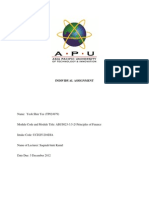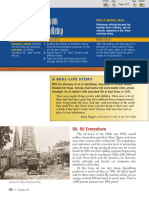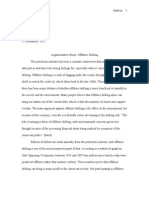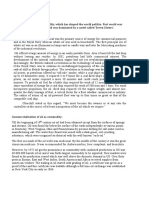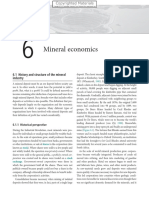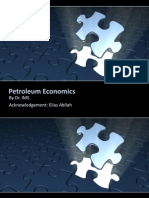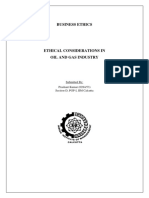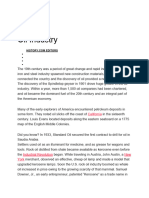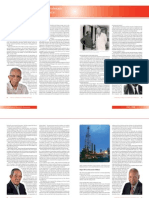0 ratings0% found this document useful (0 votes)
47 views23.3 Effects of The Oil Boom
23.3 Effects of The Oil Boom
Uploaded by
John Ross MoronThe oil boom in Texas in the early 20th century attracted thousands of workers to newly formed boomtowns near oil fields. These boomtowns were crowded, dirty places where workers lived in tents and shacks. The growing automobile industry and discovery of other uses for oil products like gasoline and petrochemicals guaranteed a large market for Texas oil. The oil industry generated tax revenue for Texas and donations from oil producers that funded education, healthcare, arts and other institutions, leaving a significant lasting impact on the state.
Copyright:
© All Rights Reserved
Available Formats
Download as PPT, PDF, TXT or read online from Scribd
23.3 Effects of The Oil Boom
23.3 Effects of The Oil Boom
Uploaded by
John Ross Moron0 ratings0% found this document useful (0 votes)
47 views16 pagesThe oil boom in Texas in the early 20th century attracted thousands of workers to newly formed boomtowns near oil fields. These boomtowns were crowded, dirty places where workers lived in tents and shacks. The growing automobile industry and discovery of other uses for oil products like gasoline and petrochemicals guaranteed a large market for Texas oil. The oil industry generated tax revenue for Texas and donations from oil producers that funded education, healthcare, arts and other institutions, leaving a significant lasting impact on the state.
Original Description:
About Oil
Original Title
23.3
Copyright
© © All Rights Reserved
Available Formats
PPT, PDF, TXT or read online from Scribd
Share this document
Did you find this document useful?
Is this content inappropriate?
The oil boom in Texas in the early 20th century attracted thousands of workers to newly formed boomtowns near oil fields. These boomtowns were crowded, dirty places where workers lived in tents and shacks. The growing automobile industry and discovery of other uses for oil products like gasoline and petrochemicals guaranteed a large market for Texas oil. The oil industry generated tax revenue for Texas and donations from oil producers that funded education, healthcare, arts and other institutions, leaving a significant lasting impact on the state.
Copyright:
© All Rights Reserved
Available Formats
Download as PPT, PDF, TXT or read online from Scribd
Download as ppt, pdf, or txt
0 ratings0% found this document useful (0 votes)
47 views16 pages23.3 Effects of The Oil Boom
23.3 Effects of The Oil Boom
Uploaded by
John Ross MoronThe oil boom in Texas in the early 20th century attracted thousands of workers to newly formed boomtowns near oil fields. These boomtowns were crowded, dirty places where workers lived in tents and shacks. The growing automobile industry and discovery of other uses for oil products like gasoline and petrochemicals guaranteed a large market for Texas oil. The oil industry generated tax revenue for Texas and donations from oil producers that funded education, healthcare, arts and other institutions, leaving a significant lasting impact on the state.
Copyright:
© All Rights Reserved
Available Formats
Download as PPT, PDF, TXT or read online from Scribd
Download as ppt, pdf, or txt
You are on page 1of 16
23.
3 Effects of the Oil Boom
Boomtowns
The spectacular
fortunes made in the
oil business drew
thousands of people
to the Texas oil fields
and nearby towns.
Called boomtowns
because they grew
along with economic
booms.
The towns were
crowded, dirty and
rough places.
Boomtowns
Texans arrived at these
towns seeking work in the
oil industry.
Oil field workers lived in
tents or wooden shacks.
The dirt streets of the town
became rivers of mud
when it rained.
Above all, boomtowns
were busy places where
people were trying to
make money.
The Automobile and Petrochemical
Industries
Oil companies grew
at a time when
electricity was
rapidly replacing
kerosene for
lighting homes.
Fortunately for oil
producers, new
uses for petroleum
were being
discovered
The Automobile and Petrochemical
Industries
Because oil was
cheaper than coal, it
quickly replaced coal
as fuel for steam
engines.
The use of
automobiles with
internal combustion
engines was also
increasing
These engines use
gasoline, and oil by-
product
The Automobile and Petrochemical
Industry
When Americans
started to buy cars,
the demand for
gasoline went up.
The growing
popularity of the
automobile
guaranteed the Texas
oil industry millions of
customers.
The Automobile and Petrochemical
Industries
Scientists continued to
develop new uses for
petroleum.
Petrochemicals made from
oil and gas, became an
important part of the Texas
economy.
Petrochemical products
include synthetic rubber,
plastics, and carbon black,
which is used to make ink,
tires and other products
Effects of the Oil Boom
The oil boom attracted many
young farm workers to jobs in
the oil fields.
Most drilling and production
jobs were reserved for white
workers.
Despite facing discrimination
in the oil fields, African
American and Mexican
American workers found jobs
as teamsters and hauling
goods to and from the oil
fields.
Many oil workers travelled
from town to town as they
followed new oil strikes
The Effects of the Oil Boom
The oil boom affected
Texas politics and the
environment.
State officials began to
pass restrictions designed
to control parts of the oil
industry.
The legislature passed laws
regarding abandoned wells
and the protection of
ground water from oil
pollution.
20 years later, the
legislature made it illegal
to waste oil and natural
gas.
The Effects of the Oil Boom
In 1917, the legislature
gave the Texas Railroad
Commission, an agency
originally created to
regulate the railroads,
authority to enforce laws
concerning the petroleum
industry.
The commission set
standards for spacing
between wells and for
pipeline transport of oil
and gas.
These rules helped prevent
over drilling.
The Effects of the Oil Boom
The state government
also began collecting
taxes on oil production
in 1905, taking in
more than $101,000
in taxes that year.
By 1919, taxes
collected on oil
production rose to
more than $1 million.
The Effects of the Oil Boom
This money helped fund the state
government and education
program for Texas children.
Higher education in Texas also
benefitted from the state’s oil
production.
In 1876, Texas also set aside 1
million acres of land in West
Texas for the Permanent
University Fund.
Texas A&M University
Texas universities received money
from the sale or use of this land.
Santa Rita #1 oil well struck oil in
1923 and the income went into
the Permanent University Fund
The Texas A&M University system
and the University of Texas
system continue to share the
money in this fund.
University of Texas
The Effects of the Oil Boom
Texas also benefitted
from oil producer’s
philanthropy – the
giving of money or
gifts.
Hugh Roy Cullen gave
large gifts to the
University of Houston
and the Texas Medical
Center
Texas Medical Center
The Effects of the Oil Boom
Walter William
Walter Fondren and Sid
William
Fondren
Richardson both
gave money and
gifts to Texas
schools, hospitals
and other social
Sid
institutions
Richardson
The Effects of the Oil Boom
Other oil producer
gave generously to
the arts in Texas.
John and
Dominique de
Menil established a
collection of more
than 10,000 works
of art for public
Dominique de Menil
display.
The Effects of the Oil Boom
Oil producers have provided many jobs
and spurred related industries in Texas
You might also like
- Citroen DS Repair Manual 814 Vol 1 March 1974Document450 pagesCitroen DS Repair Manual 814 Vol 1 March 1974Mickyman12363% (8)
- LDR 04 - 644G - English PDFDocument336 pagesLDR 04 - 644G - English PDFdanielch123No ratings yet
- ALLISON 501-KC5 & KB5: (Construction Details)Document32 pagesALLISON 501-KC5 & KB5: (Construction Details)Anand Mishra100% (1)
- Refining HistoryDocument26 pagesRefining HistoryS M AseemNo ratings yet
- PF AssignmentDocument14 pagesPF AssignmentYeoh Shin YeeNo ratings yet
- Diesel Engine Cylinder Head CatalogueDocument11 pagesDiesel Engine Cylinder Head CatalogueEACC20026875% (4)
- Ds Pf8v71nDocument2 pagesDs Pf8v71nEsteban Medina Lemos100% (2)
- CHE 322 - Gaseous Fuel ProblemsDocument26 pagesCHE 322 - Gaseous Fuel ProblemsDanice LunaNo ratings yet
- The Oil Boom After Spindle Top Pgs 420-424Document5 pagesThe Oil Boom After Spindle Top Pgs 420-424api-293238977No ratings yet
- The Oil Industry in TrinidadDocument27 pagesThe Oil Industry in TrinidadMariah CampbellNo ratings yet
- Canadas Oil Sands - Most Destructive Project On Earth or Ethical Oil?Document6 pagesCanadas Oil Sands - Most Destructive Project On Earth or Ethical Oil?Mantas SinkeviciusNo ratings yet
- SpindletopDocument6 pagesSpindletopapi-540296556No ratings yet
- Spindletop Oil WellDocument2 pagesSpindletop Oil WellemmaNo ratings yet
- Oil BoomDocument13 pagesOil Boomjaskfaj skdjfbsaNo ratings yet
- Damian ArgumentativeDocument5 pagesDamian Argumentativedamians93No ratings yet
- Anada S Il Ands Onanza: C ' O S BDocument4 pagesAnada S Il Ands Onanza: C ' O S BjcsolanasNo ratings yet
- Refining Capacity Fact Sheet - Oct05Document7 pagesRefining Capacity Fact Sheet - Oct05georgiadisgNo ratings yet
- Charging Forward: Lithium Valley, Electric Vehicles, and a Just FutureFrom EverandCharging Forward: Lithium Valley, Electric Vehicles, and a Just FutureNo ratings yet
- Courtney Powell Krystyna Range Jenecca WilliamsDocument29 pagesCourtney Powell Krystyna Range Jenecca Williamsbewitchedgal2000No ratings yet
- CanadaDocument10 pagesCanadairfan julNo ratings yet
- Pipelines: Historical Back GroundDocument3 pagesPipelines: Historical Back GroundAhmed SalemNo ratings yet
- Introduction To Petroleum Engineering: PETR 2001Document44 pagesIntroduction To Petroleum Engineering: PETR 2001Dillon FraserNo ratings yet
- Oil Sands GeographyDocument20 pagesOil Sands Geographygianpaoloamato25No ratings yet
- Business Ethic Translated FRDocument7 pagesBusiness Ethic Translated FRsaidanefarah2No ratings yet
- Natural GasDocument6 pagesNatural GasCoral Bautista SantanaNo ratings yet
- OIL and GAS IntroductionDocument28 pagesOIL and GAS IntroductionShaliniIlavarapuNo ratings yet
- TCT2 - TP 2 Library of Congress Oil Gas IndustryDocument6 pagesTCT2 - TP 2 Library of Congress Oil Gas IndustryRomanNo ratings yet
- About Canada Oils SandsDocument64 pagesAbout Canada Oils SandsEyoma EtimNo ratings yet
- History of OilDocument7 pagesHistory of OilprashantNo ratings yet
- Our Nation, Their Interest: Executive SummaryDocument6 pagesOur Nation, Their Interest: Executive SummaryforestethicsNo ratings yet
- Strategic Importance of OilDocument7 pagesStrategic Importance of OilDilip JainNo ratings yet
- 10.1007@978 3 030 16275 78Document29 pages10.1007@978 3 030 16275 78Muhaiminul IslamNo ratings yet
- History of HydrocarbonsDocument9 pagesHistory of HydrocarbonsSamuel AcquahNo ratings yet
- DD - His 02.02Document7 pagesDD - His 02.02jujust24370No ratings yet
- Mineral Economics: 6.1 History and Structure of The Mineral IndustryDocument21 pagesMineral Economics: 6.1 History and Structure of The Mineral IndustryDirceu NascimentoNo ratings yet
- Crude OilDocument28 pagesCrude OilJohn W. Paterson IV100% (2)
- Us RefiningDocument14 pagesUs Refiningapi-482524077No ratings yet
- Case StudyAnalysis1Document17 pagesCase StudyAnalysis1Christian SamsonNo ratings yet
- 1 Introduction - HistoryDocument16 pages1 Introduction - HistoryMohamed AlaaNo ratings yet
- History Oil of Oil and GasDocument3 pagesHistory Oil of Oil and Gasugoreg100% (1)
- Prashant Kumar 0284 53 Section D Ethics Considerations in Oil and Gas IndustryDocument13 pagesPrashant Kumar 0284 53 Section D Ethics Considerations in Oil and Gas IndustryVineet VinodNo ratings yet
- Oil Spills, Ethics, and Society: How They Intersect and Where The Responsibilities ResideDocument63 pagesOil Spills, Ethics, and Society: How They Intersect and Where The Responsibilities ResideArt RodriguezNo ratings yet
- The Challenges and Potential of Canada's Oil SandsDocument4 pagesThe Challenges and Potential of Canada's Oil SandsNabil Bin IdrisNo ratings yet
- 1Document29 pages1عبدربه منصورNo ratings yet
- Oil Politics: By, Muhammad Sharjeel Hussain Namrah Hambal Mariba Daniel Noor-e-ZehraDocument18 pagesOil Politics: By, Muhammad Sharjeel Hussain Namrah Hambal Mariba Daniel Noor-e-ZehraImdadNo ratings yet
- Global Oil and Gas IndustryDocument23 pagesGlobal Oil and Gas IndustryYash Agarwal100% (1)
- AFPM Annual Report 2012Document32 pagesAFPM Annual Report 2012Meghhs100% (2)
- UpdatedDocument8 pagesUpdatedradoslav micicNo ratings yet
- America's History Chapter 10: The Economic Revolution, 1820-1860Document10 pagesAmerica's History Chapter 10: The Economic Revolution, 1820-1860irregularflowers100% (1)
- "The Shaleman Cometh: How The U.S. Energy Culture Is Changing The World," by J. C. Whorton, Jr.Document40 pages"The Shaleman Cometh: How The U.S. Energy Culture Is Changing The World," by J. C. Whorton, Jr.The International Research Center for Energy and Economic Development (ICEED)No ratings yet
- Ministry of Energy - Overview T&T Petroleum Post IndependenceDocument11 pagesMinistry of Energy - Overview T&T Petroleum Post Independenceronnysingh1No ratings yet
- (Forest Ethics) Tar Sands Refineries Report (Sept 2012)Document9 pages(Forest Ethics) Tar Sands Refineries Report (Sept 2012)HeavenL77No ratings yet
- Introduction To Oil & Natural Gas PDFDocument100 pagesIntroduction To Oil & Natural Gas PDFSaid SalemNo ratings yet
- How A Monster' Texas Oil Field Made The U.S. A Star in The World MarketDocument7 pagesHow A Monster' Texas Oil Field Made The U.S. A Star in The World MarketVanshNo ratings yet
- GAS Vs GROUSEDocument19 pagesGAS Vs GROUSEdini prayita100% (3)
- Petroleum: Fossil Fuels-Coal, Petroleum (Oil), and Natural Gas - Are Concentrated OrganicDocument7 pagesPetroleum: Fossil Fuels-Coal, Petroleum (Oil), and Natural Gas - Are Concentrated OrganicAyii AlfredNo ratings yet
- Chapter 18Document18 pagesChapter 18ewrweNo ratings yet
- Advantages, Disadvantages and Economic Benefits Associated With Crude Oil TransportationDocument12 pagesAdvantages, Disadvantages and Economic Benefits Associated With Crude Oil TransportationRüstəm Emrah QədirovNo ratings yet
- Pipeline Transportation Systems - An Underwriting OverviewDocument18 pagesPipeline Transportation Systems - An Underwriting OverviewAmir KhosravaniNo ratings yet
- Chapter 9-Guided Reading NotesDocument5 pagesChapter 9-Guided Reading NotesVicky CuiNo ratings yet
- Lesson 25 The Rise of IndustryDocument29 pagesLesson 25 The Rise of Industryfishertr1No ratings yet
- Trail Smelter ArbitrationDocument5 pagesTrail Smelter ArbitrationSheila GarciaNo ratings yet
- New Oil and Gas DR Enow-1Document37 pagesNew Oil and Gas DR Enow-1njouadarelNo ratings yet
- Oil in Texas: The Gusher Age, 1895–1945From EverandOil in Texas: The Gusher Age, 1895–1945Rating: 4 out of 5 stars4/5 (1)
- Features and Benefits: Model CB 15-100 HP BoilersDocument5 pagesFeatures and Benefits: Model CB 15-100 HP BoilerssebaversaNo ratings yet
- Failure of BPR: Kenya Petroleum Refineries Limited: By: Saloni MaheshwariDocument8 pagesFailure of BPR: Kenya Petroleum Refineries Limited: By: Saloni MaheshwariSaloni MaheshwariNo ratings yet
- Typical PampID Arrangement For 3 Phase Separator VesselsDocument2 pagesTypical PampID Arrangement For 3 Phase Separator VesselsKmt_AeNo ratings yet
- Let's CheckDocument3 pagesLet's CheckJm DelmonteNo ratings yet
- Petrochemical Industry in India - Determinants, ChallengesDocument5 pagesPetrochemical Industry in India - Determinants, Challengesvvk2cool100% (1)
- For Assessment of Action WorkDocument9 pagesFor Assessment of Action WorkGenelle Mae MadrigalNo ratings yet
- NSRP Asset OwnerDocument6 pagesNSRP Asset OwnerLy Minh PhuongNo ratings yet
- Natural Gas Cleaning and TreatmentDocument13 pagesNatural Gas Cleaning and Treatmentvamsix100% (1)
- AeroShell Turbine Oil 500 PDFDocument2 pagesAeroShell Turbine Oil 500 PDFAnonymous oAbjbl4HNo ratings yet
- ChemistryDocument196 pagesChemistryGovind LanghaniNo ratings yet
- Lubricantes y AdhesivosDocument74 pagesLubricantes y AdhesivosHenryMonteagudoParedesNo ratings yet
- Module 3 Steam ReformingDocument33 pagesModule 3 Steam ReformingAfiq Asraf100% (1)
- Technical English IDocument46 pagesTechnical English IMidhunRameshThuvasseryNo ratings yet
- Biodiesel b7 SpecDocument1 pageBiodiesel b7 SpeccassindromeNo ratings yet
- Industrial Process FurnacesDocument11 pagesIndustrial Process FurnacesMohammed AlkhafajiNo ratings yet
- Pluses and Minuses of Caustic TreatingDocument7 pagesPluses and Minuses of Caustic Treatingargacho100% (1)
- Gas Turbine Working Principles: Bahman ZohuriDocument27 pagesGas Turbine Working Principles: Bahman ZohurimarpelNo ratings yet
- Template ST 2019Document1 pageTemplate ST 2019Reza RamadhanNo ratings yet
- 01 Genera Lover View of Step Less Capacity Control of Reciprocating CompressorDocument15 pages01 Genera Lover View of Step Less Capacity Control of Reciprocating Compressorsumantabal_uceNo ratings yet
- Burner 52Document2 pagesBurner 52ynmoihcppwlkaizbciNo ratings yet
- Crude OilDocument5 pagesCrude OilSyed Bakhtyar AhmedNo ratings yet
- MSDS Cat 15w40 PDFDocument10 pagesMSDS Cat 15w40 PDFpom technicalNo ratings yet
- Main Engine Layout FamiliarizationDocument4 pagesMain Engine Layout Familiarizationrajjsmit1989No ratings yet
- Calculating PVT PropertiesDocument10 pagesCalculating PVT PropertiesRyan RodriguezNo ratings yet




